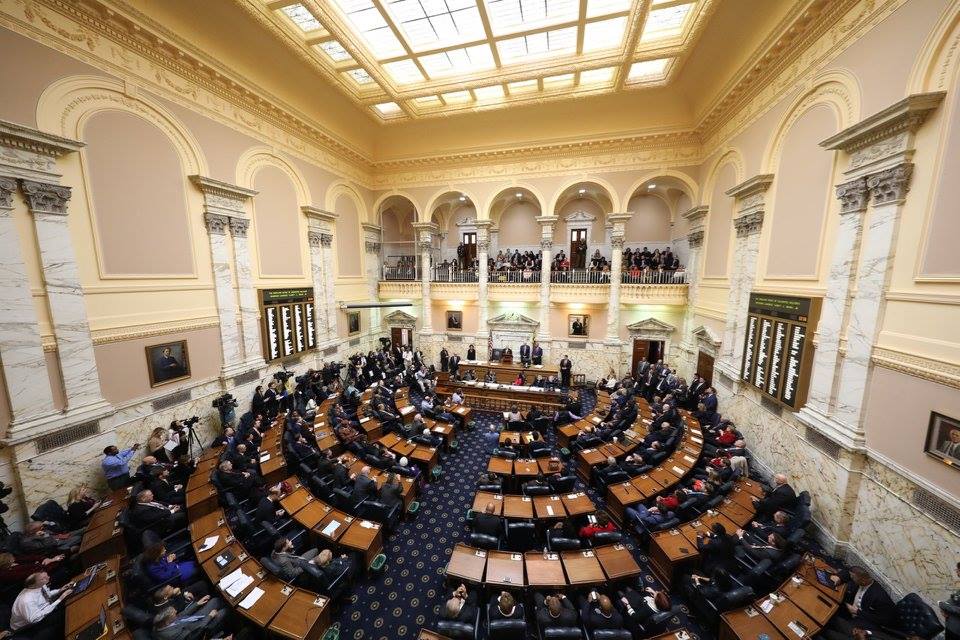By Megan Poinski
Megan@MarylandReporter.com

Looking west from the State House steps, thousands fill Lawyer's Mall, Bladen Street and Rowe Boulevard for "Keep the Promise" rally.
The protest by more than 10,000 state teachers and employees last Monday was not enough to keep two dozen members of the House Appropriations Committee from approving major changes to their pensions Friday.
Accepting many of the changes proposed by Gov. Martin O’Malley and a special pension commssion, the committee voted to increase contributions for all employees, reduce the amount of benefits for new hires, raise retirement ages and length of service, cap cost-of-living adjustments, and add a pension fee for local governments.
The pension system has an unfunded liability of at least $18 billion — less than two-thirds of full funding — and the committee action also delayed increasing the state contribution to the system.
Contributions go up
Changes include:
• Increasing contributions for those in the employees’ pension system and teachers’ pension system from the current 5% to 7%.
• Increasing contributions for those in the law enforcement officers’ pension system from the current 4% to 6% in fiscal year 2012. In fiscal year 2013, their contribution would increase one more percentage point to 7%.
• Increasing judges’ contributions from 6% to 8%.
New employees would see similar contribution levels, but would have to work longer before retiring and have a different multiplier to determine benefits, different ways of determining compensation, and a longer amount of time until they are vested and entitled to a pension.
Longer service
Changes for new employees approved by the committee include:
• Requiring new members of the employees’ pension system and the teachers’ pension system to either work 30 years, or be 65 with 10 years of service before retiring.
• Requiring new law enforcement employees to be 50, or to have 25 years of work before retiring.
• Allowing new members of the employees’ pension system and the teachers’ retirement system to retire early at age 60, or with 15 years of service. Their pensions would be reduced 0.5% for every month before their 65th birthdays.
• Decreasing the multiplier for the employees’ retirement system and teachers’ retirement system to 1.5%. Right now, it is set at 1.8%. The multiplier establishes the percentage of salary in the pension for each year of employment.
• The pension will be determined by the five consecutive years with the highest average, not the current three years. Legislative analysts said that this will cause significant future savings to the system, but the impact will not be evident immediately.
• Vesting all new employees in the system after 10 years, rather than the current five years. Judges would still be vested as soon as they enter the system.
Capping COLAs
The system’s biggest savings would come through limiting cost-of-living adjustments. O’Malley proposed capping COLAs for new employees at 3% in any year that the pension system meets its investment rate of return, and capping them at 1% in years that investments perform poorly. Current employees would see their COLAs remain the same.
The committee voted for an alternative plan, which would save $80 million by extending the COLA caps to all employees for any service credit earned from fiscal year 2012 onward.
The committee quickly threw out the idea of splitting pension costs 50-50 between local governments and the state, but they accepted a measure that would have local jurisdictions paying the state for operating the system. Each local jurisdiction that participates in the retirement system would pay an administrative fee of $163 per employee to the state.
Proposed reduction causes concern
One of the more controversial changes to pensions was reducing the state’s contribution to the system in fiscal year 2013. O’Malley proposed reducing the state’s contribution by $120 million in fiscal 2012, and giving the system $60 million less than it should in fiscal 2013. The committee voted to leave the reduction in place for fiscal year 2012, and double the reduction for 2013 – meaning for two years in a row, the state will underfund the pension system by $120 million.
Several delegates balked at such a reduction in the future. Del. Nancy Stocksdale, R-Carroll County, said that her constituents were OK with paying a little more for their pensions, but not with that money going to the general fund, where it can be used for any purpose.
Others had problems understanding the logic of this move.
“How do we justify taking $120 million this year, $120 million next year, and we’re only at 64% funding now?” asked Del. Tony McConkey, R-Anne Arundel County.
Analysts replied that because the changes made by the committee reduced spending, there is more flexibility on how finances in the system can be allocated. The state – specifically the general fund – is still slated to contribute $1.5 billion to the system.
Del. Melony Griffith, D-Prince George’s County, who chairs the pension oversight subcommittee, replied that more flexibility in state spending could mean more funds to the pension system, and the change does not make much of a difference in the long run. With the reduction, she said, the state is still on track to fund its pension system at the mandated 80% by 2023.






Why dont the Senators and Delegates introduce legislation to allow them to reduce their pay and their retirement benefits. They have no problem taking for others, but they wont ever touch their benefits. They end up getting rediculous pensions for 90 days of work per year.